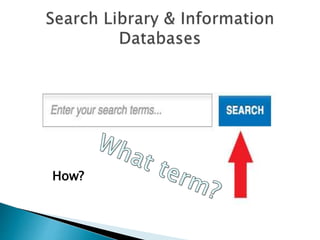Search Library and Information Databases : Constructing searches
- 1. How?
- 2. Identify and access a database Constructing Searches
- 3. ’üĮ Conducting a search - review of last session: - identify sources of information ŌĆō databases, etc. - access ŌĆō password, step by step procedures - OHS consideration
- 4. Session Topic: Constructing Searches Session aim: To learn the concepts and techniques in constructing searches in an online TAFE database, to help develop skills and knowledge in searching library and information databases.
- 5. ’üĮ Session outline: - Develop right search strategy - Basic and Advanced searches ŌĆō definitions, commonalities and differences - Boolean search operators - Simultaneous demonstration/application - Assessment
- 7. ’üĮ Constructing Searches Develop search strategy Identify key concepts or ideas. Use alternative keywords for each concept. Understand the concept and use of available search tools.
- 8. Basic and Advanced Search: ’üĮ Basic search ŌĆōoffers a few, commonly used fields for a simplified search experience. ’üĮ Advanced search ŌĆō offers more in-depth search via additional fields
- 9. ’üĮ Basic and Advanced search commonalities: ’āś Can be toggled between from within the same search page of the database by clicking the "Advanced Search" or "Basic Search" link as appropriate. ’āś You can click the Search button or type Return/Enter to perform your search.
- 10. ’āś Clear button : This will clear all criteria from the searchable fields. ’āś Use of Boolean operators, limiters and expanders are available
- 11. ’üĮ Basic and Advanced search differences: ’āś Use of Boolean operators hard to specify in Basic search. ’āś Additional fields feature in Advanced search: easy to use Boolean operators to specify how search term is to be treated or where in the results should the term appear.
- 13. ’üĮ Booleans ŌĆśANDŌĆÖ, ŌĆśORŌĆÖ and ŌĆśNOTŌĆÖ ’āś Boolean logic defines logical relationships between terms in a search. ’āś Operators are used to create a very broad or very narrow search.
- 14. ’üĮ Demonstration ’āś Basic Search ’āś Advanced Search ’āś Use of Boolean Operators [and, or, not]
- 15. ’üĮ Summary: Constructing searches starts with the development of search strategies - analysing and breaking down the topicŌĆÖs concepts into keywords or using relevant alternative words to use in the search. It also involves understanding the concepts of different types of search functionalities that will enable us to broaden or narrow our search.
- 16. ’üĮ Training Competency: At the end of this unit, the trainees will develop skills and knowledge in searching and retrieving information from an online database. The unit focuses on ANZRC database available within the TAFE Adelaide Library campus, and the skills necessary to formulate effective search strategies to meet the traineeŌĆÖs information needs.
- 17. ’üĮ Reminders: ’āś Session 3 ŌĆśRefining SearchesŌĆÖ ŌĆō (for external students) online at http://sweetsuccessle.blogspot.com.au/ ’āś Click on the ŌĆśTrainingŌĆÖ tab and then the link on session 3. All hand-outs and instructions are available on this link. ’āś Email: zulsilago_10@hotmail.com
- 18. ’üĮ "There's a way to do it better -- find it." - Thomas Edison
Editor's Notes
- #7: Image Source: http://www.kulfoto.com/funny-pictures/33796/shopping-strategy













![’üĮ Demonstration
’āś Basic Search
’āś Advanced Search
’āś Use of Boolean Operators [and, or, not]](https://image.slidesharecdn.com/topic2pp-150403032332-conversion-gate01/85/Search-Library-and-Information-Databases-Constructing-searches-14-320.jpg)



